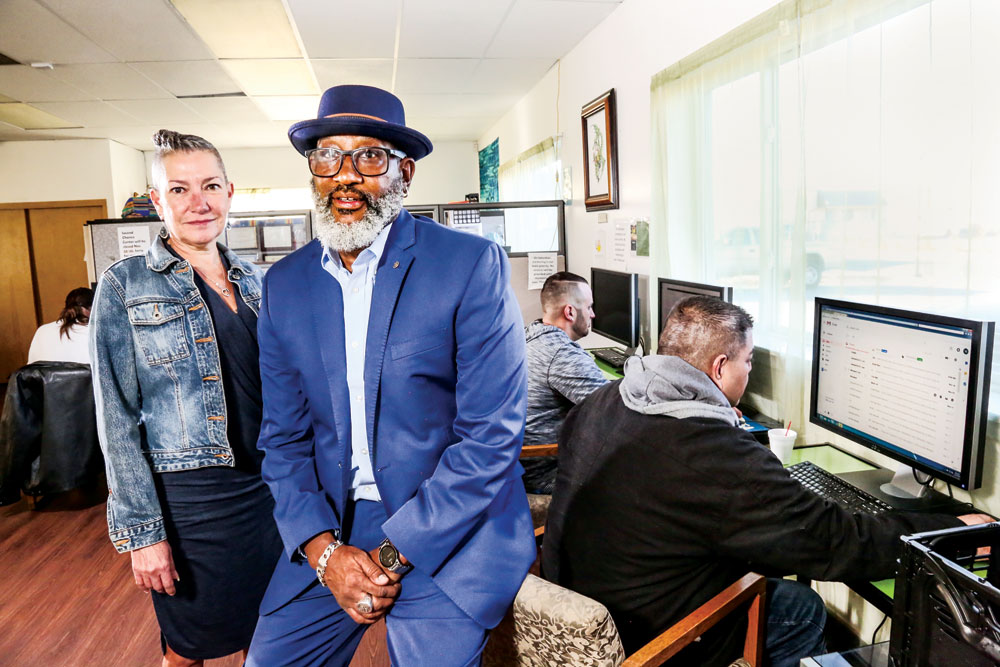
Second Chance Director of Operations Dana Jenkins and Executive Director Hassan Latif say the program’s constituents know they are “part of” the family the organization has created—not “apart from,” as they have felt most of their lives.
Hassan Latif speaks like Oprah’s “SuperSoul” guests discussing their spiritual journeys. His words spill out in eloquent, mission-driven paragraphs that are at once inspiring and humbling.
Latif is Executive Director of Aurora’s Second Chance Center, Inc., a nonprofit he established in 2012 “to help formerly incarcerated people transition to lives of success and fulfillment.” It recently received an award for its low recidivism rate of 9%, which stands in stark contrast to Colorado Department of Corrections recent data showing a 50% recidivism rate in 2017. While the majority of these were the result of technical violations rather than new crimes, a recidivism rate of 9% is extraordinary.
Located at 16th and Dayton streets in Aurora, about 1,300 people come through its doors each month to avail themselves of a hot meal, computer training, addictions counseling, support groups, emergency housing and other services.
Latif lived for eighteen years as an inmate in Colorado penitentiaries, and understands the profound challenges individuals confront the moment they leave incarceration. The khaki pants, blue polo, and plastic shoes that are standard-issue for released inmates make them easy targets for predators, who know they are likely carrying a $100 debit card plus cash from years of underpaid prison labor. “People walk out and this is a whole new world for them….if you’ve just been released…you’re already desperate.” Giving these folks new clothes is the first step in reintegrating them into a world that is different than the one they knew before they had a record of a prison term.
For many people who have served time, life on the outside can be disorienting and isolating, leading to a return to prison—usually for technical violations. Second Chance Center’s Director of Operations Dana Jenkins reflects on her own experiences on the outside after serving twenty years. Though she eventually found a job that allowed her to use the cosmetology license she had earned in prison, she felt disconnected. “I had been home for three years and had checked all the boxes of what is acceptable… But I was ready to go back to prison…I wasn’t going to do anything to get there, but being out was entirely too hard….There’s never anybody that looks like you.”
That changed when she met Latif, who understood what she was experiencing. Jenkins persevered, and through her work at Second Chance Center she now helps to provide the support and resources that make re-entry a success for hundreds of clients. Among her many responsibilities, Jenkins helps furnish clients’ apartments. Donated furnishings and household items allow her to create spaces that communicate dignity and support reentry.
Second Chance’s remarkable success in reducing recidivism has less to do with a new outfit or a furnished apartment than it does with the family Latif and his staff have created. “Showing them that they are a part of, instead of apart from, which is how they’ve felt most of their lives,” allows people the secure footing they need to move beyond their past, says Latif. He reminds clients, “The better they do, the better we are going to be able to do…They actually empower us to change the landscape by buying into Second Chance.”
“We know how people sabotage their own efforts…and our people coming in the door know that we know that, so we get a level of trust from the beginning. They have to trust that it’s safe to do that and that they’re not alone in that journey,” says Latif.
Patrick Firman, Sheriff for the City and County of Denver, echoes Latif’s words by emphasizing the importance of giving people access to services after release to ensure they do not return to the system. “We contract with Denver Health for all of our medical and mental health services. We’ve got some pretty progressive medication-assisted treatment programs…we’ve got community groups so that we can do a warm handoff. Things like peer support. We’ll pay for the taxi ride to go from our front door to the community resource center….those are the kind of things that we need to continue to build on.” He says community collaboration is essential to getting people the ongoing support they need.
In addition to the downtown Denver Detention Center, Firman’s office oversees the Denver County Jail, a Stapleton neighbor on Smith Road. Firman says about 50% of the jail population suffers from mental health issues. In 2016, his department implemented Crisis Intervention Training for its deputies, to provide them the skills and understanding needed to work more effectively with inmates. The Denver Police Department recently launched a co-responder program to reduce the number of people being locked up. “They have mental health professionals that ride along with the police officers. They help the police officers understand if they’re going to a call with somebody in crisis what might be going on, what resources might be available other than just bringing them to jail… that’s been successful in helping police officers make good, informed decisions on what to do.”
Latif states that 98% of the people currently incarcerated will be released into society at some point. “It behooves us to be concerned about what treatment is available to them on the inside, and concerned about what assistance is available to them on the outside,” he says. Helping people to successfully transition is not merely the right thing to do; it is a matter of community health and wellbeing and a matter of minimizing the tax dollars being absorbed back into what he calls “the black hole of corrections.”
For more information about Second Chance Center visit www.scccolorado.org or view a video about Second Chance at https://youtu.be/XtISgqHg8L8
If you have household furnishings to donate, call Zach at 303.537.5838 to schedule pick up or drop off.


0 Comments